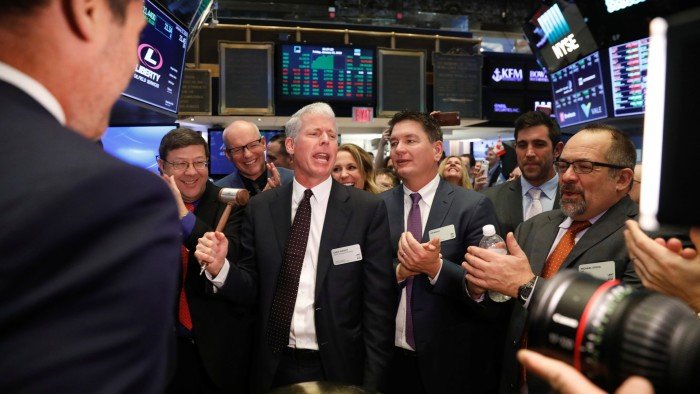Donald Trump has nominated shale boss Chris Wright as energy secretary, a role that would put the oilman at the heart of the administration’s drive to loosen restrictions on the fossil fuel industry.
The Financial Times reported on Friday that Wright, the chief executive of oilfield services group Liberty Energy, was the most likely candidate for the job.
Wright “has been a leading technologist and entrepreneur in Energy,” Trump said in a statement. As energy secretary, he “will be a key leader, driving innovation, cutting red tape, and ushering in a new ‘Golden Age of American Prosperity and Global Peace.’”
Trump also appointed Wright to a new “Council of National Energy,” to be headed by former North Dakota governor Doug Burgum, which will coordinate an overhaul of energy policy across government agencies.
The president-elect, who has launched an effort to cut government spending helmed by Elon Musk and Vivek Ramaswamy, reiterated his call to slash regulation.
“This Council will oversee the path to U.S. ENERGY DOMINANCE by cutting red tape, enhancing private sector investments across all sectors of the Economy, and by focusing on INNOVATION over long-standing, but totally unnecessary, regulation,” Trump said.
Wright and Liberty Energy did not immediately respond to a request for comment.
Wright’s proposed appointment marks another big win for the US oil industry, which supported his candidacy, and gives him a key role in enacting the president-elect’s plans to increase liquefied natural gas exports.
Trump vowed on the campaign trail to undo President Joe Biden’s pause on LNG export permits on “day one” of his administration, a task that would fall to his new energy secretary.
Harold Hamm, founder of Continental Resources and Trump’s most prominent industry backer, touted Wright as a candidate for the role, describing him as “very, very good on energy”.
“He knows it really well,” Hamm told the Financial Times in an interview in October.
Wright’s nomination will probably face staunch opposition from environmentalists, however. The oil boss courted controversy last year when he lashed out at the use of terms including “climate crisis”, “clean energy” and “carbon pollution”.
“There is no climate crisis and we are not in the midst of an energy transition either,” he said in a video posted to LinkedIn. He later denied he was “fight[ing] climate science”.
Ray Washburne, chair of petrol station chain Sunoco, and Paul Dabbar, a tech executive who is leading Trump’s transition team for energy roles, were also in the mix for the energy secretary job, according to people familiar with the Trump transition team’s thinking.
Washburne served as president of the Overseas Private Investment Corporation in Trump’s first administration and previously sat on the board of Energy Transfer, a pipeline company led by Trump donor Kelcy Warren.
Dabbar also served in the previous Trump administration, as under-secretary for science in the energy department.
Wright is the latest addition to Trump’s administration with ties to the fossil fuels industry after Burgum was appointed Trump’s energy tsar on Friday.
Burgum, who will also serve as interior secretary, will be tasked with co-ordinating Trump’s energy agenda across government agencies and enacting a sweeping deregulation plan to boost fossil fuel supplies.
“America is blessed with vast amounts of ‘Liquid Gold’ and other valuable Minerals and Resources, right beneath our feet,” Trump said in a statement on Friday announcing Burgum’s appointment.
“We will ‘DRILL BABY DRILL’, expand ALL forms of Energy production to grow our Economy, and create good-paying jobs,” he said in the statement.
On top of its role overseeing exports, the Department of Energy is responsible for the nuclear weapons programme, environmental clean-ups and scientific research and development through its oversight of the country’s national laboratories.
Jennifer Granholm, Biden’s energy secretary, has played a prominent role promoting the Inflation Reduction Act, the president’s landmark climate law, which Trump has vowed to repeal.
Granholm told the FT any efforts to unpick the legislation, which earmarked billions of dollars in tax credits for clean energy would be equivalent to “stabbing ourselves because it would be so foolish”.






